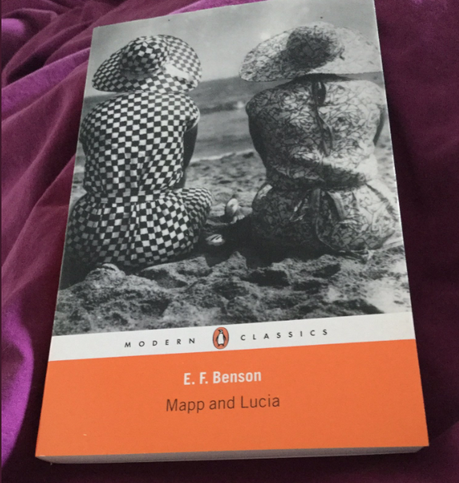
Feeling a little under the weather a couple of weeks ago, I decided I needed something to cheer me up. E. F. Benson’s much-loved novel Mapp and Lucia seemed an excellent choice. I didn’t expect to have such a peculiar reading experience though. Mapp and Lucia has been on my piles for ages and ever since I got it, I saw people mention it as a novel they loved. When I mentioned on Twitter that I was planning to read it, the reactions were enthusiastic. Logically, I was sure, I would love it but for the first hundred pages I did not only not love it, I almost hated it. And then, I still don’t know why, I started to like it so much, that I still miss reading it. I believe that’s what some people call a book hangover.
At the beginning of the novel, we find Lucia and her best-friend Georgie, still in Riseholm, where Lucia owns the most beautiful house and occupies the center of the social life. That is, she did before her husband died. While he’s been dead for over a year, Lucia felt it was her duty to still live like a recluse. But enough is enough and she’s planning to re-enter Riseholm’s social life and be its queen again. Georgie who missed her shenanigans, is happy that she’s finally back. We’re led to believe that her mourning was only in part real, a lot of it was just for show. And so are most things with Lucia. She does and says so much just for show and to grab the attention of the people around her. One of the funniest things she does for show, is pretending that she speaks Italian. She addresses Georgie, and other people, constantly with little Italian sentences and phrases, exclaims her joy or distaste in Italian morsels. The people of Riseholm and Tilling admire and envy her for that.
After reclaiming the Riseholm stage, Lucia is soon bored and wishes to conquer new territory. She decides to rent Mallard, the most beautiful house in Tilling. The house belongs to Miss Mapp, the center of Tilling’s social life. Just like Lucia, she’s an attention-grabber, self-centred to the max, and never shies away from thinking about her own advantage. It’s the custom amongst the Tilling upper middle-class to sublet their homes in summer. Mallard being the most expensive one, it’s rented to foreigners; the next in line, Diva’s house, is taken by Miss Mapp. Diva rents someone else’s, and so on. Luckily for Lucia, Georgie decides to rent Mallard cottage and join her for the summer. He will prove, once more, to be her most ardent ally.
At first, things are amicable enough, but soon Lucia isn’t satisfied anymore and wants to become the center of Tilling. Things are a bit different here though. While there was no real competition for her in Riseholm, there’s formidable Miss Mapp in Tilling to be reckoned with. She’s the most important person in Tilling and there’s nothing that she doesn’t preside over, nothing she doesn’t decide, much to the annoyance of some of the other inhabitants of Tilling. Lucia might always have wanted to become Tilling’s most influential person, but having competition spurs her on even more. In Miss Mapp, she’s found her match. While things don’t often turn out the way Miss Mapp has planned, she still wins more than one small skirmish in this war.
As I said, initially, I hated the book because I found the characters obnoxious and nasty. But once the reader gets to see behind Lucia’s mask and Miss Mapp defeats her more than once, it’s more and more enjoyable.
And there’s life at Tilling. A carefree life that’s so different from most of our lives nowadays. Not only because it’s set before WWII, but because it’s set among the British upper middleclass. Nobody works in this book. All the main characters own beautiful houses. All they think about is, where they will dine next, who gives the best tea party. Gossip and petty quarrels aside, it’s a peaceful world. The conflicts are entirely the character’s own making. Nothing dramatic ever comes from outside. At least not until the end. After a while, I found spending time in this world very comforting. And funny. It’s a terrific social comedy. Lucia’s pretense to know Italian is hilarious and so is the way they constantly try to outsmart each other.
When I got the book, I wasn’t aware that it was part of a series, and not even the first in the series, but the fourth. Luckily, it works very well as a stand-alone. As far as I know, this is the first of these books that feature both Lucia and Miss Mapp.
Has anyone read other books in this series? Are they just as good?
